#Ukrainian book industry
Explore tagged Tumblr posts
Text
How to help the Ukrainian Book Industry
As per usual, I forget to post on Tumblr now a days. Let's talk Faktor Druk.
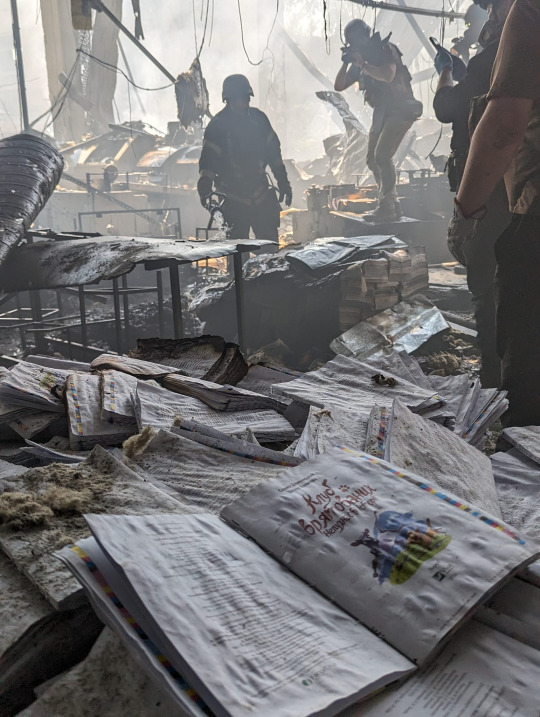
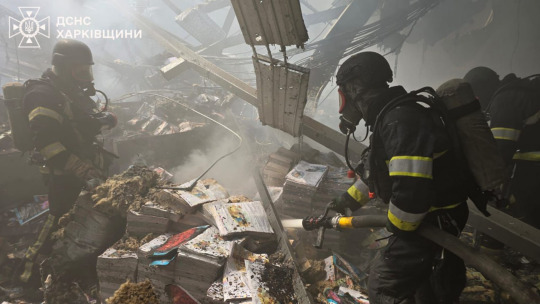
What happened?
Russia launched 15 missiles at Kharkiv. Faktor Druk, a printing house was hit twice (in total 3 strikes in the general area). Last I heard, 7 are dead. 22 are wounded. (During the strike, 50 employees were in the building.)

Why it matters? Most Ukrainian publishers had books printed there. Every 3rd Ukrainian book was printed there [Source]. You may think "it's only 50 000 fiction books", but no, it includes textbooks. As in, kids might not get any textbooks, because who else will print them when most books are printed in Kharkiv?
"The printing house Faktor-Druk is part of the Faktor company group, which also includes the renowned Ukrainian publishing house and bookstore Vivat. Faktor-Druk has the capacity to produce approximately 50 million hardcover and paperback books, 100 million magazines, and 300 million newspapers annually. The facility employs 400 people and encompasses 15,822 square meters of production space. According to Forbes Ukraine, Faktor-Druk is one of only two factories in Ukraine that can print products for Disney and Marvel, having successfully passed a rigorous multi-level audit." [Source]
Now how to help? Countries are trying to help with rebuilding, but here are some things you can do.
Vivat posted about a fundraiser for Faktor Druk. Originally posted here by CEO Yuliya Orlova. Reposted to Vivat website here.
Based on my own experience, I believe it is crucial to channel our grief and anger into action. How can you do that?
Ways to support: Donate to the Armed Forces of Ukraine, they are our heroes! Keep buying Ukrainian books! Factor-Druk is one of the largest printing houses in Ukraine, where not only Vivat books are printed, but also many books from other publishers, as well as newspapers, magazines, calendars, school notebooks for your children and grandchildren.⠀ How to help: The Factor company has initiated a fundraiser. All donations will be used to support those affected and to restore the printing industry. Details can be found at the following link: https://vivat.com.ua/blog/udar-po-drukarni-faktor-druk-yak-dopomohty/ [Source]
Vally_v on Instagram is doing a fundraiser raffle below for the chance to win this edition of Ivan Franko's “Manipuliantka”.
instagram
You can support the publishers by buying Ukrainian books and ebooks (most print their books through Faktor).
On the whole, this destruction is part of the larger war where Russians have been destroying Ukraine.
Some more background
The first year of the full-scale invasion led to a 50% decrease in demand [Source]. Shelling in Kharkiv has led to a backlog due to limited electricity and a shortage of qualified personnel [Source].
In terms of operations, within 2022:

From the start of the full scale invasion to April 25th of 2024, the Russians have damaged 1062 cultural heritage sites [Source]:
Specifically, architectural and urban planning sites comprise 316 objects, architecture – 307, historical– 226, architecture and urban planning, historical – 61, archaeology – 56, architecture, historical – 39, monumental art – 21, urban planning and monumental-decorative art – 19, architecture, monumental art – 7, urban planning – 5, science and technology, architecture – 2, architecture and monumental art – 1, architecture, garden and park art – 1; architecture and garden and park art – 1.
From that same period of time, Russians damaged 1987 cultural institutions (324 destroyed) [Source].
"In total, the following have been affected: – Creative hubs: 958 – Libraries: 708 – Art education institutions: 153 – Museums and galleries: 114 – Theaters, cinemas, and philharmonic halls: 36 – Parks, zoos, reserves: 15 – Circuses: 3"
There is also this interactive map of the book ecosystem in Ukraine:
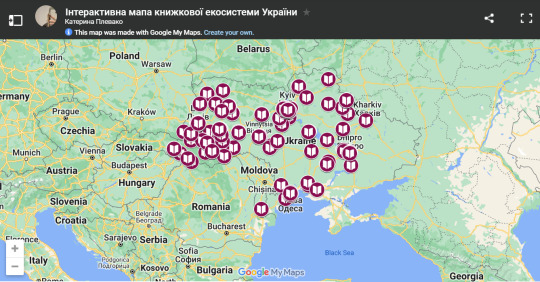
Links:
Oleksiy Hrushevsky. Ukrain's printing companies suffer 40% capacity cuts after Russian attack on Kharkiv printing house. Online.ua.
Russian army attacks printing house in Kharkiv causing injury and death – UPDATED. Chytomo.
Porter Anderson. Russian Attack Hits Ukraine’s Factor-Druk Printing House. Publishing Perspective.
Porter Anderson. Europe’s Publishers: Anger, Solidarity After Kharkiv Attack. Publishing Perspective.
Олеся Дерзська. Як ракетний удар по «Фактор-Друк» вдарить по книгоіндустрії? Speka.
Factor Group of companies on Facebook.
Yuliya Orlova on Facebook. [Vivat CEO]
Vivat on Facebook. Книгарка Vivat on Telegram.
Sergey Polituchiy on Facebook.
Over 50,000 books destroyed and three publishers affected in Russian strike on Kharkiv printing house. Ukrains'ka Pravda.
Тетяна Леонова. «Українці — не варвари, ми не палимо книжки»: Олена Рибка, шеф-редакторка видавництва Vivat автор. Nakypilo.
Анна М’ясникова. Харківська друкарня після обстрілу. Фоторепортаж. Nakypilo.
On the Ukrainian publishing industry:
[Dec. 2022] The State of the Ukrainian Book Publishing Sector During Wartime. Ukraine World.
[23.12.2022] Anastasia Zagorui & Oksana Khmeliovska. 9 months of invasion: how Ukrainian publishers work in times of war. Chytomo.
[12.08.2022] Anastasia Zagorui. How Ukrainian publishers work during the war. Chytomo.
[12.02.2024] Iryna Baturevych. The Ukrainian Publishing Market 2023: “Competition has reached unprecedented levels”. Chytomo. (old poll, but gives some perspective).
[06.05.2024] Ministry of Culture and Information Policy of Ukraine. Due to russian aggression in Ukraine, 1062 cultural heritage sites have been affected.
[02.05.2024] Ministry of Culture and Information Policy of Ukraine. 1987 cultural infrastructure objects have been damaged or destroyed due to russian aggression.
[April 2023] A Brief Overview of the Ukrainian Publishing Sector : Supporting Ukrainian Publishing Resilience and Recovery (SUPRR).
[Oct 2023] Ukraine’s book business during war: Ukrainians want to read their own, but Russia may enter the market again. Rubryka.
[April 2024] Against all odds: How Ukrainian book publishing navigates challenges of war. Rubryka.
[04.04.2024] The constant shelling of Kharkiv leads to major backlog for Ukrainian books-in-print. Chytomo.
Interactive map:
Interactive map of the Ukrainian book ecosystem. Ukrainian Book Institute.
Thanks for reading, this turned out to be a super long post.
#I may have gone overboard with links but in my defense - I look up it up and western outlets don't include info from publishers#Faktor Druk#Kharkiv#russian invasion of ukraine#Vivat#Ranok#Sergey Polituchiy#Ukrainian literature#Ukrainian book industry#Book industry#Publishing#There's a lot of links so one may be misaligned - in that case search the title and website#Instagram
16 notes
·
View notes
Text
Russian culture is great just because they constantly erase literature and kill artists from the country that russians want to conquer

This photo speaks volumes 💔😭

Today, the Russians struck one of the largest printing complexes in Europe, the Factor-Druk in Kharkiv. "Kharkiv used to be the center of book publishing in Ukraine and remains so even under constant shelling. Every third book published in the country is printed by Factor-Druk," wrote the Sense bookstore chain. "This is one of the largest full-cycle printing complexes in Europe, so books from almost all Ukrainian publishers are printed there," Vivat Publishing House reported. ❗Since the beginning of the year, more than 700 libraries have been destroyed or vandalized in Ukraine.


#ukraine#kharkiv#russia is a terrorist state#russian invasion of ukraine#russo ukrainian war#genocide#stop the genocide#russian imperialism#russian culture is erasing Ukrainian culture#world#stand with ukraine#video#russian war crimes#war crimes#український tumblr#український тамблер#укртумбочка#important#signal boost#world news#culture#art#books#literature#russian propaganda#publishing house#publishing industry#twiter#unmute#sound on
104 notes
·
View notes
Text

I love the graphic cover of this Ukrainian 1928 yearbook on the sugar industry. Beets, books, and chemistry!
Title: Yezhegodnik po sakharnoy promyshlennosti / Redaktirovali J. A. Kukharenko Еже��одник по сахарной промышленности / Редактировали Н. А. Кухаренко, 1928. by Ukrainskij Naučno-issledovatel. Institut sacharnoj promyšlennosti.
49 notes
·
View notes
Text
Since the beginning of the year, more than 700 libraries have been destroyed or damaged in Ukraine.
Russia struck Ukraine’s major printing press, Faktor-Druk in Kharkiv, killing at least 5 employees among the 7 dead & 20 injured. Kharkiv is the heart of Ukraine’s publishing industry. This attack on culture underscores the genocidal nature of Russia’s war. Factor-print was bombed exactly one week before the Book Arsenal (book festival), just when dozens of publishing novelties were being rushed to print. The bombing was aimed at preventing these books from being published, at preventing Ukrainians from having book fairs - for a quarter of a century, the Russians had managed to silence them using other methods, and now that they have started to find their feet, they are using bombs and missiles. And all for the sake of the "great Russian culture". Forcing people to read this literature because of the absence of destroyed Ukrainian literature. My deepest condolences to the families of the victims and to the Vivat publishing house (the bookshop belongs to them).
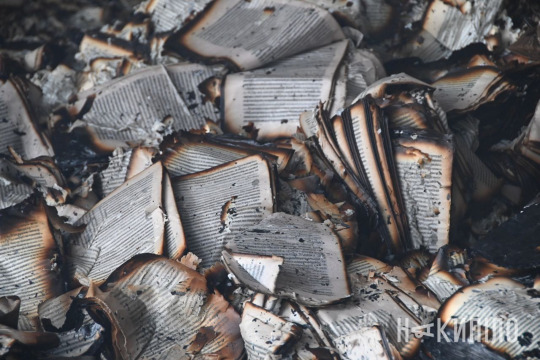
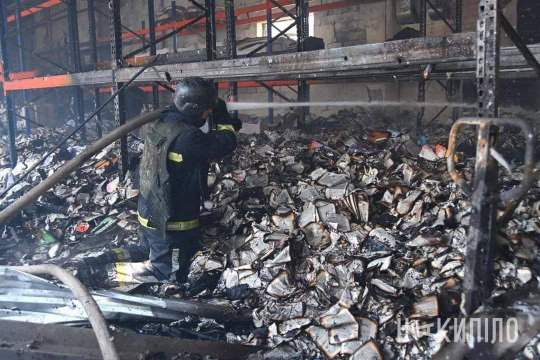
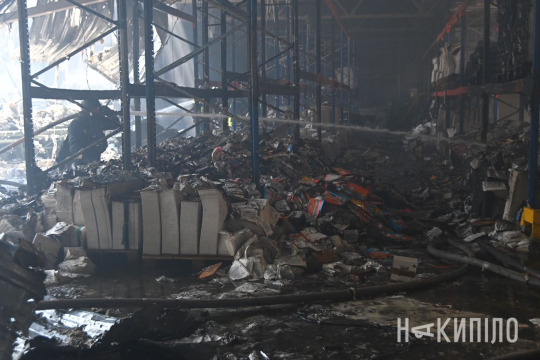
#stop russian aggression#russian terrorism#russian aggression#war in ukraine#kharkiv#stand with ukraine#literature#books#book#publishing#leo tolstoy#dostoyevski#fyodor dostoevsky#dostoevksy#fuck russia#russian culture
867 notes
·
View notes
Text








Photos of Soviet Ukraine from the Soviet Ukrainian photo book "Song of Our Native Land" a book dedicated to the 60-year anniversary of the USSR. 1982
"The Hero-City of Kiev, the capital of the Ukrainian SSR"
"The industrial Donbas"
"The fields of the Dnieper area"
"Ciscarpathia. "Hutsulshchina" tourist centre"
"Trembita players"
"The sound of Ukrainian bandura…"
"Monument to the great Ukrainian poet Taras Shevchenko"
#communism#history#socialism#leftism#marxism#marxism leninism#ussr#europe#soviet union#ussr history#ukraine
217 notes
·
View notes
Text
“There are only so many books on Ukraine we can review each month,” an editor from a major British newspaper tells me at one of the country’s largest literary festivals. He looks a bit uncomfortable, almost apologetic. He wants me to understand that if it were up to him, he’d review a book on Ukraine every day, but that’s just not how the industry works.
Since the start of Russia’s full-scale invasion, I’ve had a glimpse into how several industries work: Publishing, journalism, and the broader world of culture, including galleries and museums. Even before the big war, I knew more than I wanted to about how academia works (or rather doesn’t) when it comes to Ukraine. A common thread among all these fields is the limited attention they allocate to countries that do not occupy a place among the traditional big players of imperial politics.
Cultural imperialism lives on, even if its carriers often proclaim anti-colonial slogans. It thrives in gate-keeping, with editors and academics mistrusting voices that don’t sound like those higher up the ladder, while platforming those who have habitually been accepted as authoritative. “We’ve done Ukraine already” is a frequent response whenever you pitch an idea, text, or public event centering the country.
The editor who can’t keep publishing reviews of Ukraine-related books walks away, and I pick up a copy of one of the UK’s most prominent literary magazines to see their book recommendations. Out of a handful of reviews, three are on recent books about Russia. It seems like the space afforded to Russia remains unlimited. I close the publication to keep my blood pressure down.
Keeping my blood pressure down, however, is challenging. When my social media feeds aren’t advertising another production of Uncle Vanya, they’re urging me to splash out on opera tickets for Eugene Onegin. What happened to the dreaded “cancelling” of Russian culture? The Russia section in most bookshops I visit in the UK is growing daily with everything from yet another translation of Dostoevsky to accounts of opposition figures killed or imprisoned by the Kremlin.
The international media focus on the August 2024 release of Russian political prisoners was yet another example of how the more things change, the more they stay the same. While these released prisoners were provided with a global media platform to call for an end to “unfair” sanctions on “ordinary Russians,” there was no mention of the thousands of Ukrainian civilians who continue to languish in Russian jails.
The ongoing international emphasis on all things Russian goes hand in hand with a reluctance to transform growing interest in Ukraine into meaningful structural changes in how the country is perceived, reported on, and understood. Although there has been some improvement in knowledge about Ukraine since 2022, the move is essentially from having no understanding to having a superficial grasp.
Each time I read a piece on Ukraine by someone not well-versed in the country’s history and politics, my heart sinks. The chances are it will recycle historical cliches, repeat Kremlin propaganda about Russophone Ukrainians, or generalize about regional differences. And to add insult to injury, such articles also often misspell at least one family or place name, using outdated Russian transliterations. A quick Google search or a message to an actual Ukrainian could prevent these errors and save the author from looking foolish. Yet aiding this kind of colonial complacency seems to bother neither the authors nor the editors involved.
I often wonder what would happen if I wrote a piece on British or US politics and misspelt the names of historical figures, towns, and cities. How likely would I be to get it published? And yet the same standards do not apply when it comes to writing about countries that have not been granted priority status in our mental hierarchies of the world. We can misspell them all we like; no one will notice anyway. Apart from the people from those countries, of course. And when an exasperated Ukrainian writes to complain, I can almost see the editors rolling their eyes and thinking, “What does this perpetually frustrated nation want now? We’ve done Ukraine. Why are they never satisfied?”
It is not enough to simply “do Ukraine” by reviewing one book on the war, especially if it’s by a Western journalist rather than a Ukraine-based author. It’s not enough to host one exhibition, particularly if it is by an artist or photographer who only spent a few weeks in the country. Quickly putting together a panel on Russia’s war in response to a major development at the front and adding a sole Ukrainian voice at the last minute doesn’t cut it either. This box-ticking approach is unhelpful and insulting.
It is important to acknowledge that some Western media outlets have significantly enhanced their coverage of Ukraine over the past two and a half years. They have typically done so by dedicating time and resources to having in-house experts who have either reported from Ukraine for many years, or who are committed to deepening their knowledge enough to produce high-quality analysis. However, many of these outlets still seem compelled to provide platforms for individuals entirely unqualified to analyse the region. Surely this isn’t what balance means?
Since February 2022, more than 100 Ukrainian cultural figures have been killed in the war. According to the Ukrainian Ministry of Culture, by May 2024, over 2,000 cultural institutions had been damaged or destroyed. This includes 711 libraries, 116 museums and galleries, and 37 theatres, cinemas, and concert halls. In May 2024, Russia bombed Factor Druk, the country’s biggest printing house.
When I attended this year’s Kyiv Book Arsenal, Ukraine’s largest literary festival, each panel began with a minute of silence to honor the memory of colleagues killed in the war. All this is in addition to mounting military losses, many of whom are yesterday’s civilians, including journalists and creatives who have either volunteered or been drafted into the army. This is the current state of the Ukrainian creative industry.
To save time for Western editors, publishers, and curators, let me clarify what all of us perpetually frustrated Ukrainians want. We would appreciate it if they turned to actual Ukraine specialists when working on Ukraine-related themes. Not those who suddenly pivoted from specializing in Russia, or who feel entitled to speak authoritatively because they discovered a distant Ukrainian ancestor, or those who have only recently shown interest in Ukraine due to business opportunities in the country’s reconstruction. We would be grateful if they took the time to seek out experts who have been studying Ukraine long before it became fashionable, who understand the country in all its complexity, and who care enough to offer Ukrainians the basic dignity of having their names spelt correctly.
I like to fantasise about a time when editors of top Western periodicals will choose to review books on Ukraine not simply because the country is at war and they feel obliged to cover it now and again, but because these books offer vital insights into democracy, the fight for freedom, or the importance of maintaining unity and a sense of humor in times of crisis. I hope for a day when galleries will host exhibitions of Ukrainian art, not just because it was rescued from a war zone, but because the artists involved provide fresh perspectives on the world.
I also dream that we, the perpetually frustrated Ukraine specialists, will eventually be able to focus on our own scholarship and creativity rather than correcting the mistakes and misleading takes of others. This will happen when cultural institutions, publishing houses, universities, and newspapers acquire in-house experts whose knowledge of Ukraine and the wider region extends beyond Russia.
Dr Olesya Khromeychuk is a historian and writer. She is the author of The Death of a Soldier Told by His Sister (2022). Khromeychuk has written for The New York Times, The New York Review of Books, The Guardian, Der Spiegel, Prospect, and The New Statesman, and has delivered a TED talk on What the World Can Learn From Ukraine’s Fight for Democracy. She has taught the history of East-Central Europe at several British universities and is currently the Director of the Ukrainian Institute London.
133 notes
·
View notes
Text
Google Drive full of book PDFs about Chernobyl
Link to the Google Drive if you don't want to click the title: https://drive.google.com/drive/folders/1kscKFciW6almJA8p-0sUQPO3c0A4AQYe
Note: It will be updated regularly - for as long as I'll be able to find/get new things =) So far I've compiled 41 books in three languages.
Just to repeat what I said in the first post: I'm open to any requests or suggestions or even PDFs themselves, if someone wants to share theirs from their collection. Message me, send me an ask, throw a rock through my window - whatever you prefer, just please, do it yourself because I'm too scared to message anyone, thanks. No fiction - that's the only rule. Any language is welcome - if you want me to look for a certain book in the language of your choice, I'll do that. If you have a book in language other than English, I'd love to add it to the Drive! If you have a better version of whatever PDF I've already got, then I'd be more than happy to do a swap.
Now, some of my reasoning, if anyone's interested: first of all, I think it's important for everyone to be able to access stuff like this. Think of it as a library, minus the "give these back" part. Secondly, I get soooo mad when people are like haha, found this super rare, basically impossible to find, very expensive book! ...I shall now keep it exclusively to myself. Ma'am, you're ruining the vibe and stalling everyone's hobby research but I guess you do you...
List of all the books (under the cut):
In English:
Voices from Chernobyl - Alexievich S.
Chernobyl Reactor Accident - Source Term
Chernobyl - Insight from the Inside - Dr. Chernousenko V.M.
How It Was - Dyatlov A.S.
(ENG+RUS) Chernobyl Booklet
Chernobyl: The Devastation, Destruction and Consequences of the World’s Worst Radiation Accident - Fitzgerald I.
Final Warning. The Legacy of Chernobyl - Gale R.P.
Midnight in Chernobyl: The Untold Story of the World’s Greatest Nuclear Disaster - Higginbotham A.
INSAG-1
INSAG-7
Interesting Chernobyl - 100 Symbols
From Chernobyl To Fukushima - Karpan N.
Manual for Survival. A Chernobyl Guide to the Future - Kate Brown
Chernobyl. Confessions of a Reporter - Kostin I.
The Politics of Invisibility. Public Knowledge about Radiation Health Effects after Chernobyl - Kuchinskaya O.
Memories - Kupnyi A.
Chernobyl 01:23:40 - The Incredible True Story of the World’s Worst Nuclear Disaster - Leatherbarrow A.
Chernobyl Notebook - Medvedev G.
No Breathing Room - Medvedev G.
Chernobyl Record - The Definitive History of the Chernobyl Catastrophe - Mould R. F.
Wormwood Forest - A Natural History of Chernobyl - Mycio M.
Life Exposed: Biological Citizens After Chernobyl - Petryna A.
Chernobyl: History of a Tragedy - Plokhy S.
Ablaze - Story of Chernobyl - Read P.P.
Producing Power: The Pre-Chernobyl History of the Soviet Nuclear Industry - Schmid S. D.
Chernobyl: A Documentary Story - Shcherbak I.
The Vienna Report
Chernobyl - Crime Without Punishment - Yaroshinskaya A.A.
In Russian:
Chernobyl: Kak eto bylo. Preduprezhdeni - Kopchinsky, Steinberg
Chernobyl. Tak eto bylo. Vzglyad Iznutri - Voznyak Ya. Troitskiy N.
Лучевая болезнь человека (очерки) - Гуськова А.К., Байсоголов Г.Д.
Чернобыль. Как это было - Дятлов А.С.
Чернобыль: 30 лет спустя - Кравчук Н.В.
Живы - Купный А.
Чернобыль - Щербак Ю.
(ONLY Pages 367-383) Чернобыль, 10 лет спустя. Неизбежность или случайность?
KGB files - pre and post accident (includes additional information in Ukrainian)
In Polish:
Jak to było - Diatłov A.S.
Czarnobyl - Plokhy S.
Czarnobyl - Sekuła P.
Katastrofa w Czarnobylu - Sekuła P.
Czarnobyl. Od katastrofy do procesu - Siwiński W.
#chernobyl#26th april 1986#nuclear power plant#chornobyl#nuclear disaster#chernobyl hbo#you wouldn't download a car#file: special interest: chernobyl#Чернобыль#pripyat#rbmk 1000#radiation#free resources#free books
523 notes
·
View notes
Text
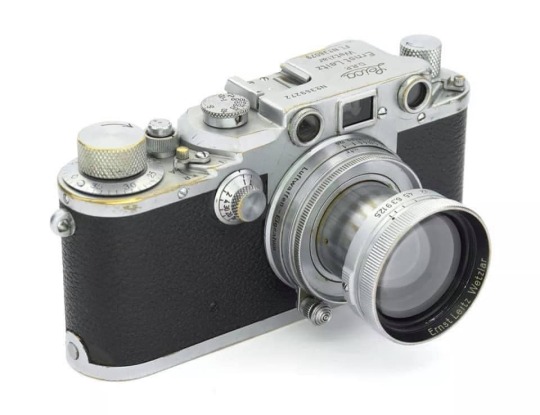
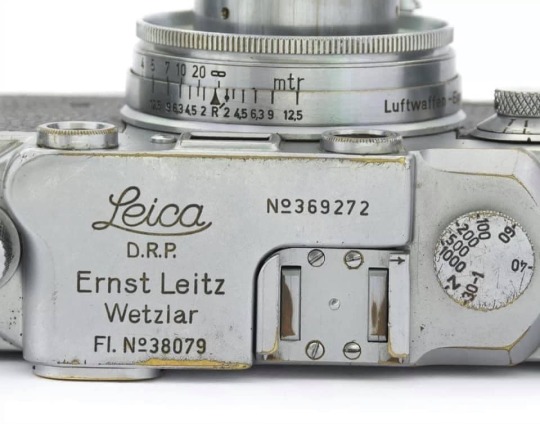
LEICA AND THE JEWS
The Leica is the pioneer 35mm camera. It is a German product - precise, minimalist, and utterly efficient.
Behind its worldwide acceptance as a creative tool was a family-owned, socially oriented firm that, during the Nazi era, acted with uncommon grace, generosity and modesty. E. Leitz Inc., designer and manufacturer of Germany's most famous photographic product, saved its Jews.
And Ernst Leitz II, the steely-eyed Protestant patriarch who headed the closely held firm as the Holocaust loomed across Europe , acted in such a way as to earn the title, "the photography industry's Schindler."
As soon as Adolf Hitler was named chancellor of Germany in 1933, Ernst Leitz II began receiving frantic calls from Jewish associates, asking for his help in getting them and their families out of the country. As Christians, Leitz and his family were immune to Nazi Germany's Nuremberg laws, which restricted the movement of Jews and limited their professional activities.
To help his Jewish workers and colleagues, Leitz quietly established what has become known among historians of the Holocaust as "the Leica Freedom Train," a covert means of allowing Jews to leave Germany in the guise of Leitz employees being assigned overseas.
Employees, retailers, family members, even friends of family members were "assigned" to Leitz sales offices in France, Britain, Hong Kong and the United States, Leitz's activities intensified after the Kristallnacht of November 1938, during which synagogues and Jewish shops were burned across Germany.
Before long, German "employees" were disembarking from the ocean liner Bremen at a New York pier and making their way to the Manhattan office of Leitz Inc., where executives quickly found them jobs in the photographic industry.
Each new arrival had around his or her neck the symbol of freedom - a new Leica camera.
The refugees were paid a stipend until they could find work. Out of this migration came designers, repair technicians, salespeople, marketers and writers for the photographic press.
Keeping the story quiet The "Leica Freedom Train" was at its height in 1938 and early 1939, delivering groups of refugees to New York every few weeks. Then, with the invasion of Poland on Sept. 1, 1939, Germany closed its borders.
By that time, hundreds of endangered Jews had escaped to America, thanks to the Leitzes' efforts. How did Ernst Leitz II and his staff get away with it?
Leitz, Inc. was an internationally recognized brand that reflected
credit on the newly resurgent Reich. The company produced cameras, range-finders and other optical systems for the German military. Also, the Nazi government desperately needed hard currency from abroad, and Leitz's single biggest market for optical goods was the United States.
Even so, members of the Leitz family and firm suffered for their good works. A top executive, Alfred Turk, was jailed for working to help Jews and freed only after the payment of a large bribe.
Leitz's daughter, Elsie Kuhn-Leitz, was imprisoned by the Gestapo after she was caught at the border, helping Jewish women cross into Switzerland . She eventually was freed but endured rough treatment in the course of questioning. She also fell under suspicion when she attempted to improve the living conditions of 700 to 800 Ukrainian slave laborers, all of them women, who had been assigned to work in the plant during the 1940s.
(After the war, Kuhn-Leitz received numerous honors for her humanitarian efforts, among them the Officier d'honneur des Palms Academic from France in 1965 and the Aristide Briand Medal from the European Academy in the 1970s.)
Why has no one told this story until now? According to the late Norman Lipton, a freelance writer and editor, the Leitz family wanted no publicity for its heroic efforts. Only after the last member of the Leitz family was dead did the "Leica Freedom Train" finally come to light.
It is now the subject of a book, "The Greatest Invention of the Leitz Family: The Leica Freedom Train," by Frank Dabba Smith, a California-born Rabbi currently living in England.
Thank you for reading the above, and if you feel inclined as I did to pass it along to others, please do so. It only takes a few minutes.
Memories of the righteous should live on.
Rabbi Yisroel Bernath
49 notes
·
View notes
Note
Regarding your last anon ask about your career, what job would you like to do if you were able to enter the art industry?
Hello, Meli, and, oh! Thank you a lot for asking! 🖤
For a long time, I wanted to have a career of an artist & writer, as in creating various conceptual arts, design, and as for writing - publishing book. I had some experience working as a graphic designer, and it wasn't that bad - yes, also quite far away from my artistic taste, but it was at least something close to what I admire.
However, as time goes, I understand that "simply" creating is not enough for me. The "scientific", "researcher" and "conceptual" layer of art is something that lives deeply in me. I understand that working as graphic designer or working on conceptiual arts is not enough for me, but what is so appealing to me is creating complex projects, from A to Z, both drawing, writing, and then, exploring the particular topics with reference to all knowledge I have. This is it.
By complex projects I mean something like making the excessive research on particular topic, and then, present it in a form of the written book with illustrations. Basically, this is who I am, to be honest - "scientific"/researcher approach + creativity (work with visual concept and text).
I already have various ideas of something like this - for example, make a huge expedition over Ukraine, my country, and save all the folklore songs and embroidery which is left, and then, creating the huge book with illustrations, text, explaining and presenting the different aspects of particular regions through the urbanistic & cultural & folklore aspects of each region with historical canvas - nothing goes unnoticed, and the history and culture always develop with people and events around them. To make it more engaging - illustration; more spectacular and not boring - writing a story about it, that would lead through centuries and the country. Make it vivid, breathing, alive and modern.
This is, you know, like an example of what I mean by "conceptual project", where the research, my knowledge about art, history, folklore, linguistics and anthropology blend with my creative side in illustrations and literature.
For me, saving, developing and promoting the culture and art, is my passion.
As for Ukraine, it's an essential need to save our culture which is destroyed every day. Some of the things we already lost forever - and that's why it's so important for me to save it. We already lost so much, something and someone. My hometown is occupied for 10 years now, and it's almost nothing left of its history. Even if you Google it, you won't find the photos before 2014. You won't be able to find almost anything about the Ukrainian roots and rich history of this incredible region. And saving all the remnants, it's not only important to me, it's important to declare to the whole world - we existed, exist and will exist, no matter what.
(but of course, I would love to make it not only about Ukraine, it's just great example on explaining why it's important to me)
I still remember how people saved from the fire during the full-scaled invasion of Ukraine the paintings of Maria Prymachenko - one of the most known and vivid folk artists who worked in naïve art style, one of the best in this field, artist, whose works were noticed by Picasso who said, after visiting a Prymachenko exhibition in Paris in 1937, "I bow down before the artistic miracle of this brilliant Ukrainian". The museum after constant attacks was on fire, 25 paintings were lost, but local people just went into the fire and saved what was left with their bare hands under constant attacks - 10 paintings.
Maybe, I'm the same like these people - would enter the fire if it means to save art, and then, showing it to the world.
So... Yeah, this is it!
Thank you a lot for asking, and I apologise for the long-read... I hope I didn't bore you...
Thank you a lot, and wish you all the best🫂
17 notes
·
View notes
Text
i've been using this account for random reblogs about books or completely unrelated posts and to follow study blogs for over a year. so now i'm starting my own study blog :) who i am? my name is rin, i'm 20 and i'm in my 4rd year of a bachelor's program in marketing. i'm chaotic in my studies, both at university and in what i study for myself, although people around me consider me responsible and organized, i'm exactly the student who turns in papers at the last moment. i choose books based on a quote and the vibe i feel from it, and google strange questions for a fanfic that will not be published, when i should've written a research paper. this kind of thing :) my academic interests: marketing research & consumer behavior & risk management my other interests: folklore and culture of my country and other countries, flowers and plants, book publishing industry, writing and worldbuilding my hobbies: gardening, knitting, writing and somewhat videography and photography (i have an old camcorder for this) languages i know: ukrainian (native) & english (fluent) languages i'm learning: korean, dutch and turkish random things i love: books (fantasy, magical realism, romance, poetry, short prose), daffodils, thrift stores, paper letters and postcards, peppermint tea, green color, summer evenings, k-dramas, bookstores, sunsets, stars, love stories my current obsessions: on the pic below!! note: the reasoning behind this blog is that one day i thought why not hype myself up and turn this half-empty account into something, at least some sort of collection of memories or knowledge diary or whatever. similar blogs inspire me a lot and i'm very grateful to the people here for what they do.
i'd be happy to just share bits and pieces of my academic life (or just life) with the community, maybe make new friends, but i want to do it for myself first and foremost.

nice to meet you and happy to see you here!
#but don't expect too much from me#i don't even know how to take pretty pictures#it'll be completely messy here#i just think if i don't start writing somewhere#i'm gonna go crazy.#study space#studyblr#study blog#studying#chaotic academia
25 notes
·
View notes
Text
The Treasury Department ordered the nation’s banking industry to start disclosing its holdings of Russian assets on Tuesday, with the goal of eventually seizing those billions of dollars in assets and selling them to aid the devastated Ukrainian economy. The disclosure is required under a new law passed by Congress earlier this year known as the REPO Act, which gives the U.S. government the authority to seize Russian state assets held by U.S. banks, with the goal of eventually selling them and giving those funds to Ukraine. While the vast bulk of Russian assets are held in Europe, it is estimated that the U.S. banking system holds as much as $6 billion in Russian assets in trust. Banks will need to report Russian assets on their books no later than Aug. 2 to the Office of Foreign Assets Control. If a bank discovers any new Russian assets on their books after the deadline, those assets need to be reported within 10 days, the Treasury Department said. Russia’s war in Ukraine, which began in February 2022, has killed tens of thousands but has also caused significant devastation to Ukraine’s economy and infrastructure. The World Bank estimated in February that Ukraine will need $486 billion for recovery and reconstruction, a figure that has only risen as the war has continued.
12 notes
·
View notes
Text
The bestselling author of “Eat, Pray, Love” is pulling her forthcoming book from publication after facing online backlash, which is baffling the literary community. Elizabeth Gilbert said Monday that she has removed her upcoming release “The Snow Forest” from its publication schedule indefinitely out of respect for victims of the ongoing war in Ukraine. “Last week I announced the upcoming publication of my most recent book called ‘The Snow Forest,’” she began the video posted to social media on Monday. Gilbert set the novel in mid-20th century Siberia and it followed a group of people who removed themselves from society to resist the Soviet government and industrialization. “But over the course of this weekend, I have received an enormous, massive outpouring of reactions and responses from my Ukrainian readers expressing anger, sorrow, disappointment and pain about the fact that I would choose to release a book into the world right now — any book, no matter what the subject of it is — that is set in Russia,” Gilbert continued.
what the fuck?
(this happened a month ago but i only just heard about it)
#?????#meanwhile gary saul morson has a new general-audience book out about russian literature#don't see anyone review-bombing that
55 notes
·
View notes
Text
This day in history

One June 20, I'm live onstage in LOS ANGELES for a recording of the GO FACT YOURSELF podcast. On June 21, I'm doing an ONLINE READING for the LOCUS AWARDS at 16hPT. On June 22, I'll be in OAKLAND, CA for a panel and a keynote at the LOCUS AWARDS.

#20yrsago Canadian copyfight hots up: Liberal MPs on the take from copyright industries? https://www.michaelgeist.ca/2004/06/copyright-reform-needs-a-balanced-approach/
#15yrsago Digital TV’s history in America: the DTV transition nearly cost the USA its technological freedom https://www.eff.org/deeplinks/2009/06/dtv-era-no-broadcast
#15yrsago Hundreds of top British cops defrauded the public for millions in phony expense racket https://www.theguardian.com/politics/2009/jun/14/expenses-fraud-detectives-scotland-yard
#15yrsago $134.5 BILLION worth of US bonds seized from smugglers at Swiss border https://www.asianews.it/index.php?l=en&art=15456&size=A
#10yrsago Atheism remains least-trusted characteristic in American politics https://www.pewresearch.org/politics/2014/05/19/for-2016-hopefuls-washington-experience-could-do-more-harm-than-good/
#10yrsago Canadian Supreme Court’s landmark privacy ruling https://www.michaelgeist.ca/2014/06/scc-spencer-decision/
#10yrsago Court finds full-book scanning is fair use https://www.eff.org/deeplinks/2014/06/another-fair-use-victory-book-scanning-hathitrust
#10yrsago Not selling out: Teens live in commercial online spaces because that’s their only option https://medium.com/message/selling-out-is-meaningless-3450a5bc98d2
#5yrsago Porno copyright troll sentenced to 14 years: “a wrecking ball to trust in the administration of justice” https://torrentfreak.com/copyright-troll-lawyer-sentenced-to-14-years-in-prison-190614/
#5yrsago Ukrainian oligarchs accused of laundering $470b, buying up much of Cleveland https://www.atlanticcouncil.org/blogs/ukrainealert/how-kolomoisky-does-business-in-the-united-states/
#5yrsago Empirical review of privacy policies reveals that they are “incomprehensible” drivel https://www.nytimes.com/interactive/2019/06/12/opinion/facebook-google-privacy-policies.html
#5yrsago Beyond lockpicking: learn about the class-breaks for doors, locks, hinges and other physical security measures https://memex.craphound.com/2019/06/14/beyond-lockpicking-learn-about-the-class-breaks-for-doors-locks-hinges-and-other-physical-security-measures/
#5yrsago Hong Kong’s #612strike uprising is alive to surveillance threats, but its countermeasures are woefully inadequate https://www.securityweek.com/surveillance-savvy-hong-kong-protesters-go-digitally-dark/
#5yrago Reverse mortgages: subprime’s “stealth aftershock” that is costing elderly African-Americans their family homes https://www.usatoday.com/in-depth/news/investigations/2019/06/11/seniors-face-foreclosure-retirement-after-failed-reverse-mortgage/1329043001/
#5yrsago Maine’s new ISP privacy law has both California and New York beat https://thehill.com/policy/technology/447824-maine-shakes-up-debate-with-tough-internet-privacy-law/
#1yrago How Amazon transformed the EU into a planned economy https://pluralistic.net/2023/06/14/flywheel-shyster-and-flywheel/#unfulfilled-by-amazon
7 notes
·
View notes
Text
All The Women’s News You Missed This Week
10/7/24-10/14/24
A South Korean Novelist takes home the Nobel Prize in Literature, Trump, and Harris vie for women voters. Women around the world continue to organize and fight male violence most notably this week accross South Africa, in Kolkata, and rural France.
Want this sent to your email? Subscribe here
US Election:
Trump to join Fox News town hall with only women in audience
Obama’s callout to Black men touches a nerve among Democrats. Is election-year misogyny at play?
Abortion has passed inflation as the top election issue for women under 30, survey finds
Women’s Health and Reproductive Rights:
‘I found out I had cervical cancer while I was pregnant’
‘The View’ abortion ad signals wider effort to use an FCC regulation to spread a message
Moreno’s abortion comment rattles debate in expensive Senate race in Republican-leaning Ohio
Texas man drops case against 3 women for helping his ex-wife get abortion pills
Transgender/Gender Critical:
A kitchen staffed by trans women is a refuge for Mexico City’s LGBTQ+ community
‘Saboteurs’ release thousands of crickets at gender-critical group LGB Alliance's London event
Colorado court ducks deciding if baker could refuse to make LGBTQ-themed cake
California Gov. Gavin Newsom signs and vetoes LGBTQ+ legislation
Florida mom of trans student sues school district, claiming retaliation and violation of rights
Women In The News:
The stats and shoes behind Chepngetich's amazing marathon world record
New Zealand ship didn’t sink because its captain was a woman, the ‘appalled’ defense minister says
American equal pay icon Lilly Ledbetter dies aged 86
Lupita Nyong'o speaks of family ordeal and condemns 'chilling' Kenya crackdown
'My employers locked me in the house and left when the bombings started'
How South Korea's 'real-life mermaids' made Malala want to learn to swim
Marine Le Pen hits back in EU funds misuse trial
Ukrainian journalist, 27, who chronicled Russian occupation dies in prison
Mothers seek justice for minors detained in Venezuelan election aftermath
Male Violence Against Women:
NY prosecutors want to combine Harvey Weinstein’s criminal cases into a single trial
Jury finds ex-member of rock band Mr. Bungle guilty of killing his girlfriend
Dad told police he killed Sara Sharif, court hears
Chris Brown concert shines spotlight on violence against women in South Africa
YouTuber Yung Filly charged with raping woman in Australia
Interpol asks public to help crack murdered women cold cases
Accused men confronted with abuse videos in French mass rape trial
Madeleine McCann suspect cleared of rape charges in separate trial
Sean 'Diddy' Combs' sex trafficking trial set for May
OnlyFans user pleads guilty in child pornography case
Arts and Culture:
South Korea's Han Kang wins Nobel Literature Prize
Art becomes outrage: Kolkata festival confronts crime against female doctor
K-pop star to testify on music industry bullying
Muni Long believes ‘Revenge’ is a dish best served with success
Riley Keough felt a duty to finish Lisa Marie Presley’s book on Elvis, grief, addiction and love
Music Review: Charli XCX’s ‘Brat and it’s completely different but also still brat’ remixes, ranked
Music Review: ‘Sex Education’ star Dua Saleh’s debut, ‘I Should Call Them’ is arty, experimental pop
Rekha at 70: Bollywood's timeless icon
Tributes paid to author's 'empathy and respect'
Experience artist Es Devlin's powerful new work
Disclaimer review: Cate Blanchett gives an 'increasingly frenzied' performance in this 'engrossing' revenge thriller
'I was told Mr Loverman was too niche for TV'
As always, this is global and domestic news from a US perspective covering feminist issues and women in the news more generally. As of right now, I do not cover Women’s Sports. Published each Monday afternoon.
#radical feminism#radblr#radical feminist#char on char#radical feminists do touch#radfem safe#radical feminist theory#radfems#radfem#All The Women’s News You Missed This Week
6 notes
·
View notes
Text
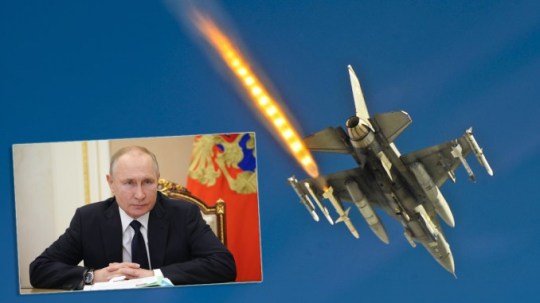
Putin Says Western Bases Hosting Ukraine’s F-16s Would Be Legitimate Targets
March 28, 2024 Russia, War in Ukraine
Putin F-16
F-16 firing an AGM-88 HARM. In the box, Vladimir Putin. (Image credit: The Aviationist, using images in the Public Domain)
Russia warns it may attack NATO bases possibly used to launch Ukraine’s F-16s.
If the F-16s are delivered to Ukraine, Russia could also strike NATO bases from which the jets would launch. The threat was issued by Vladimir Putin during a meeting with a group of pilots at Tver, northwest of Moscow. The Russian President said an escalation could be provoked by the delivery of the promised Fighting Falcon jets, for which training of Ukrainian pilots is underway.
“F-16s are capable of carrying nuclear weapons, and we will also need to take that into account while organizing our combat operations,” Putin said.
“Of course, if they are used from bases in third countries, they would be a legitimate target for us, no matter where they are,” he added.
However, the Kremlin believes not even the supply of these fighters will be able to change the course of the conflict, “We will destroy their warplanes just as we destroy their tanks, armored vehicles and other equipment, including multiple rocket launchers”.
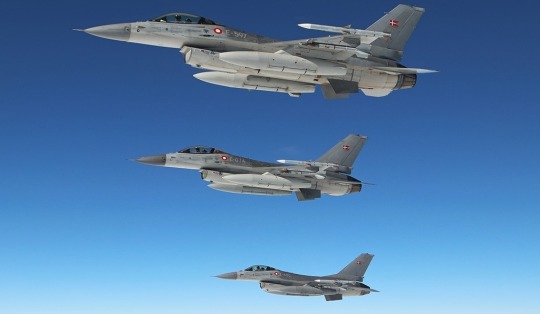
File photo of Danish F-16s. (Photo: Danish MoD)
Ukraine has long been asking its Western partners for the delivery of F-16s. Ukrainian President Zelenskyy said last year that at least 42 F-16s had been promised (the number is not known, but according to the most reliable sources, they should be 60), with the first deliveries expected by the Summer of 2024. Meanwhile, Ukrainian pilots, with different degree of flying experience, are at various stages of training, both in the U.S. and in Europe.
The delivery of the F-16s won’t be a game-changer, considering the need to integrate them in the Ukrainian Air Force, the lack of specific experience of Ukrainian pilots on the type and in view of Russia’s massive air force and sophisticated air defense systems. The weapon system requires logistic support, infrastructure and weapons: it will take years before the whole “ecosystem” that is required to sustain effective combat operations with the Fighting Falcon can be exploited at its best.
F-16 Ukraine

Ukrainian President Volodymyr Zelenskiy and Dutch Prime Minister Mark Rutte walk near an F-16, in Eindhoven, Netherlands, August 20, 2023. (Photo credits: REUTERS/Piroschka van de Wouw)
However, in the short and mid term, the “Viper” (as the F-16 is nicknamed in the pilot community) will be a quick upgrade from the current MiG-29s: the “new” jets will be used to detect, hunt and engage cruise missiles, helicopters, UAVs and Russian fighters, and to conducting air strikes on Russian targets with stand-off missiles. The F-16s can also be used to fire the AGM-88 HARM missiles (a type that was not “natively” compatible with the Ukrainian combat aircraft but was integrated with the MiG-29 and Su-27) and JDAMs bombs in SEAD/DEAD (Suppression/Destruction of Enemy Air Defenses) missions that are particularly important on the Ukrainian battlefield.
We will see.
MiG-29 AGM-88
A screenshot of the video shared by the Ukrainian Air Force showing the moment an AGM-88 HARM is fired by a MiG-29.
About David Cenciotti
@theAviationist via X
David Cenciotti is a journalist based in Rome, Italy. He is the Founder and Editor of “The Aviationist”, one of the world’s most famous and read military aviation blogs. Since 1996, he has written for major worldwide magazines, including Air Forces Monthly, Combat Aircraft, and many others, covering aviation, defense, war, industry, intelligence, crime and cyberwar. He has reported from the U.S., Europe, Australia and Syria, and flown several combat planes with different air forces. He is a former 2nd Lt. of the Italian Air Force, a private pilot and a graduate in Computer Engineering. He has written five books and contributed to many more ones.
8 notes
·
View notes
Text
One of Russia’s most famous 20th-century novels has returned to the Silver Screen. Infamously difficult to capture as a motion picture (more mystical observers even speak of a curse), Mikhail Bulgakov’s “The Master and Margarita” is back, reinterpreted by American-Russian filmmaker Michael Lockshin. The new movie stars Evgeny Tsyganov and Yulia Snigir in the titular roles and features German actor August Diehl (Gestapo major Dieter Hellstrom in Quentin Tarantino’s “Inglourious Basterds”) as the story’s demonic character Woland. Meduza reviews the controversy surrounding the film’s director and funding, the book’s cinematic history, and Lockshin’s adaptation.
The political controversy
Michael Lockshin’s “The Master and Margarita” averages an impressive 7.9/10 rating with more than 43,000 reviews at KinoPoisk and leads Russia’s box office in its opening week after earning 57.3 million rubles ($640,000) on its first day in theaters, but the director was making enemies before his film ever sold a single ticket. Self-described patriots denounce Lockshin as a Russophobe, a traitor, and a neoliberal besmircher of the intrepid Soviet secret police. They call him a hypocrite, too, in light of the fact that this new adaptation of Bulgakov’s classic was made (in 2021, before the full-scale invasion of Ukraine) with 800 million rubles ($8.9 million) from Russia’s Cinema Foundation, the state’s key funding agency for the domestic film industry.
Lockshin, who now resides in the United States, declined to answer Meduza’s questions about the backlash in Russia, saying he’s not yet ready to comment on the situation. On Telegram, pro-war channels have circulated screenshots of Facebook posts that are now hidden from non-friends where Lockshin shared independent reporting about the war in Ukraine, wrote that he’s donated to Ukrainian organizations, warned that future generations of Russians will be paying reparations for the “tragedy they brought to Ukraine,” and compared the Putin regime to Nazism in Germany.
State propagandist Tigran Keosayan has advocated criminal charges against Lockshin, while Trofim Tatarenkov, a host on Russia’s state-run Sputnik radio (who admits that he hasn’t even seen Lockshin’s movie), called the filmmaker “scum” and fondly remembered how such “enemies of the people” were shot during the Stalinist era.
Previous adaptations
In May 2016, poet and literary critic Lev Oborin wrote an essay for Meduza answering several “questions you’re too embarrassed to ask” about Bulgakov’s “The Master and Margarita,” including the most shameful of all: Can I just skip the book and watch a movie version instead? The short answer is, yes, you can always skip the book. In fact, unless you’re a student or some other kind of hostage, you can skip the movies, too. But since you asked, there are at least two previous screen adaptations of “The Master and Margarita” worth knowing about.
The better-liked version, at least until now, has been Yuri Kara’s 207-minute film, made in the mid-1990s but not released until August 2011. Meanwhile, in 2005, Vladimir Bortko created a miniseries for Russian television that was criticized for uneven casting and even worse special effects. Unfortunately for Bortko, the 10 episodes drew deeply unfavorable comparisons to his beloved 1988 adaptation of Bulgakov’s “Heart of a Dog.”
It’s also tempting to contrast Bortko’s miniseries with Kara’s adaptation — particularly how the two portrayed one of the novel’s most visually scandalous scenes: Satan’s Grand Ball. Filmed almost a decade later and made for TV, the sequence in Bortko’s series “looks almost puritanical” compared to Kara’s film, noted Lev Oborin. In raw terms of nudity and violence, this assessment is hard to contest:
youtube
So, is Lockshin’s adaptation any good?
Anton Dolin (a prominent Russian film critic who might be best known to casual Internet users as the interviewer who provoked Ridley Scott into saying, “Sir, fuck you. Fuck you. Thank you very much. Fuck you, go fuck yourself.”) liked Lockshin’s adaptation quite a bit. In a review published by Meduza, Dolin writes that the film “manages to retain the sharpness of the original source, which mocks Soviet power, and at the same time offers the viewer an innovative perspective on a classic text.”
Dolin praises Lockshin’s “Hollywood flourishes” and his capacity to juggle the book’s “genre and intonation incompatibility,” which has plagued past interpretations. The new adaptation brings a “circus element” to the story without sacrificing the script’s “rigidity,” says Dolin, while also “condensing the vastness of Bulgakov's novel into a coherent and clear narrative.” (You’ve been warned, formalists.)
Lockshin’s film takes some liberties with Bulgakov’s classic. For example, in the novel, the Master character doesn’t emerge until the middle of the book, leaving the reader to wonder about the title. In the new film, however, the main plotline belongs to the love story between Margarita Nikolaevna (the unhappily married wife of a Soviet functionary) and a writer she calls the Master. According to Lockshin’s script (which he co-wrote with Roman Kantor), the secondary narrative involving Pontius Pilate’s trial of Yeshua Ha-Notsri (Jesus of Nazareth) is a play within the story written by the Master and pulled from production by Soviet censors after its opening performance. (In a feat of authenticity unprecedented in modern Russian cinema, the Jerusalem scenes, which comprise roughly 10 minutes of the film, are performed in Aramaic and Latin.) Meanwhile, all the adventures across Moscow involving Woland and his entourage are presented as figments of the Master’s imagination as he slowly loses his mind under state persecution.
As Lockshin has argued in comments promoting the movie, Dolin says Bulgakov’s novel enjoys heightened relevance in contemporary Russia, and the new film makes menacing villains of NKVD executioners while presenting even more revolting characters in the Soviet elites whose conformity and hypocrisy enabled the Stalinist regime.
Dolin praises the decision to cast August Diehl as Woland, the mysterious foreigner whose visit to Moscow sets the plot rolling in the novel. Diehl’s Woland “is a real find,” Dolin writes. The German actor plays the character as “an infernally sarcastic gentleman in black” who resembles Satan “more than the thoughtful, sad wisemen from various Russian interpretations of the same character.”
A cartoonishly scary foreigner, complete with a spooky German accent, Woland turns out to be the creation of the writer’s wounded mind, his alter ego, writes Dolin. The censorship and persecution the character faces in the film are a “chilling reproduction” of mechanisms that resonate more in Putinist than Stalinist Russia, Dolin argues, highlighting some lines that wink boldly at modern-day realities, including nods to Crimea, oil production, and military parades.
Lockshin’s adaptation also features a fantastical version of Moscow that recalls the visionary designs of artists in the Higher Art and Technical Studios, which flourished in the 1920s before crumbling under Stalinism. In this universe, Moscow completed the Palace of the Soviets, altering the skyline in a delirious finale that depicts the city ablaze. This scene, in particular, has upset several state propagandists.
Dolin notes that Margarita is absent from the story for much of the film, but she reappears in the final act as a heroine on her own narrative arc. In the character’s scenes as a witch and then a queen, Lockshin’s intentions and the meaning of the novel’s title finally become clear, says Dolin:
It’s not the imagination of the writer that transforms the grim reality but exclusively the emotion that is capable of elevating you to the heavens, of burning cities, and punishing or pardoning with the mere force of thought. In the end, Lockshin’s film is not about Satan, not about Moscow, not about Pilate, and not about totalitarianism, censorship, or creativity, but about love. It alone makes a person invisible and free.
23 notes
·
View notes